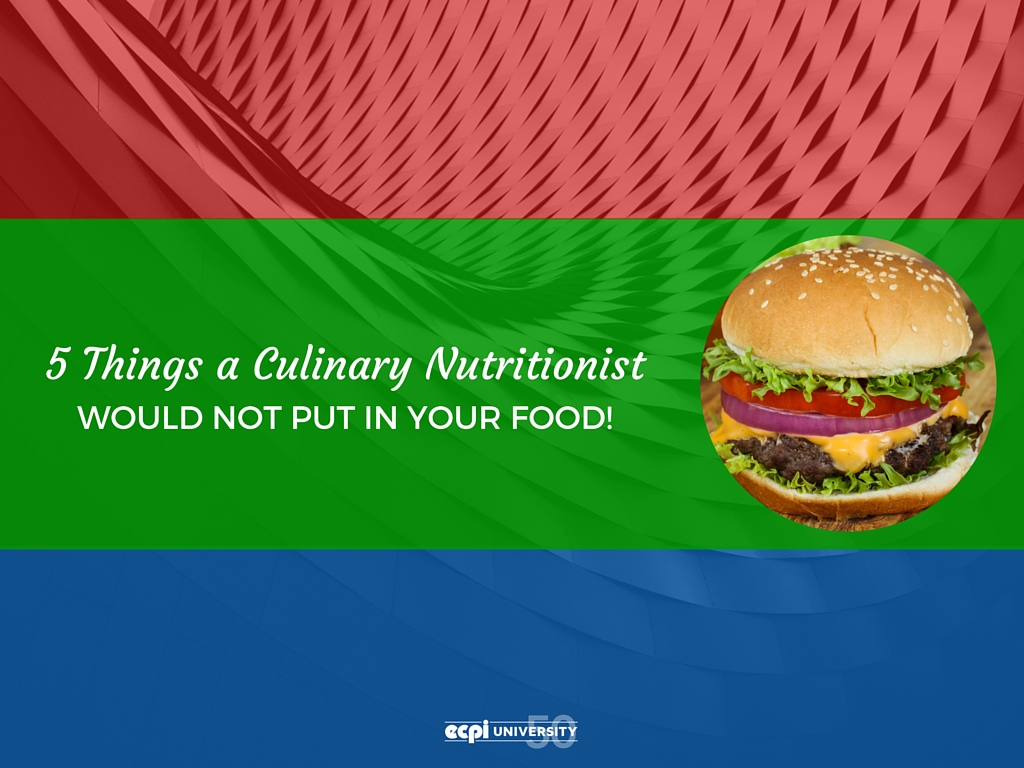
5 Things a Culinary Nutritionist Wouldn’t Put in Your Food
As the global mindset about nutritious eating moves toward a unified thinking that food should be both healthy and pleasing to the palate, the hospitality industry is responding and changing. Restaurants, hotels, and even hospitals are focusing their menus to better provide consumers with options that are not only good for them but good tasting as well. Enter, the Culinary Nutritionist and some simple advice on what to avoid in your food.
For many people, making the choice to live a healthy lifestyle and eat nutritiously is a first step toward enjoying life to its fullest. This can be an empowering decision that helps them begin an important journey that can only be for their good.
The Importance of a Culinary Nutritionist
Living a food-healthy life can be challenging.
Fortunately, there are experts on the subject who are learning more about their craft every day and developing recipes that please the taste buds as well as the nutritional needs of each consumer. Restaurants, hotels, school cafeterias, and hospitals are all likely to employ a culinary nutritionist. With a combined interest in providing delicious, top-of-the-line taste and ingredients to its customers, culinary nutritionists also understand the science behind why certain foods are healthier and better options to incorporate into their recipes.
Including these professional, specialized chefs on the payroll, businesses in the hospitality industry are ensuring their menus will have the appeal of having options that keep their health-conscious customers happy, combined with the delicious flavors and awesome aromas that have come to be synonymous with fine dining.
What Not to Eat
While culinary nutritionists will get creative in helping consumers make the right choices, there are undoubtedly some items found on every 'never, ever, ever eat this' list. If you are considering improving your food choices, check your cupboards to see if you have any of these five ingredients commonly considered to be culinary no-nos.
1. Artificial Flavoring: While many processed foods contain artificial flavoring out of necessity, there really isn't any nutritional value added. Your best option is, whenever possible use a natural ingredient to provide a delicious flavor and don't substitute with a fake.
2. Enriched Foods: Like a wolf in sheep's clothing, foods that are labeled as "enriched" often say that because they were originally stripped of their natural nutrients and then "enriched" with them again after they are altered by refining (as is the case with many wheat products). If you can have the original nutrients, why settle for something that is altered?
3. Sodium Nitrates and Nitrite: Although used in many meat products as a preservative, an excess of sodium nitrates and nitrite can build up and potentially lead to cancer. While it may be difficult to completely eliminate these preservatives from your diet, culinary nutritionists would strongly recommend that you avoid them at any cost and instead choose a higher quality cut of meat.
4. Reduced Fat Products: Okay, so maybe not all reduced fat products are bad, but many of them are loaded up with sugar to better compensate for the lack of taste that comes from naturally occurring fats. This doesn't necessarily make them better for the consumer, just lower in fat, so culinary nutritionists are reading labels and aware of what they are buying, so they won't substitute one unhealthy ingredient for another.
5. Too Much: You may be wondering, "Too much of what, exactly?" Too much of anything. Maybe the recipe will include a dash of salt, a measure of sugar, a splash of this or a cup of that. But culinary nutritionists want you to enjoy your food, even as they serve you the healthiest version possible for each meal. Completely avoiding the preservatives that are often included to make processed foods more convenient is close to impossible in this day and age of instant meals. It's important, however, that you make smart choices that include a balanced approach to healthy eating.
What's in it For You?
If you are interested in joining a field that is influencing the health of people all over the world one meal at a time, perhaps you should consider a career as a culinary nutritionist. If you are interested in obtaining more information about an Associate of Applied Science Degree in Culinary Arts and Applied Nutrition, through our Culinary Nutrition program, contact ECPI University today. It could be the Best Decision You Ever Make!
DISCLAIMER – ECPI University makes no claim, warranty or guarantee as to actual employability or earning potential to current, past or future students or graduates of any educational program we offer. The ECPI University website is published for informational purposes only. Every effort is made to ensure the accuracy of information contained on the ECPI.edu domain; however, no warranty of accuracy is made. No contractual rights, either expressed or implied, are created by its content.
Gainful Employment Information
For more information about ECPI University or any of our programs click here: http://www.ecpi.edu/ or http://ow.ly/Ca1ya.


